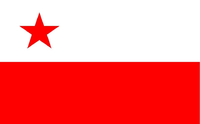Arakan Liberation Party
Arakan Liberation Party ရခိုင်ပြည် လွတ်မြောက်ရေး ပါတီ | |
|---|---|
| Secretary | U Khine Thu Kha |
| Chairperson | U Khine Ray Khine |
| Vice Chairperson | U Khine Soe Naing Aung |
| Secretary | U Khine Thu Kha |
| Founded | 20 November 1968 |
| Membership | 2,000[1] |
| Ideology |
Rakhine nationalism[2] Federalism[3] |
| Slogan | "Liberty, Equality, Fraternity." |
| Seats in the Amyotha Hluttaw |
0 / 224 |
| Seats in the Pyithu Hluttaw |
0 / 440 |
| Party flag | |
 | |
| Website | |
| Official website | |
The Arakan Liberation Party (Burmese: ရခိုင်ပြည် လွတ်မြောက်ရေး ပါတီ; ALP) is a Rakhine political party in Myanmar (Burma). The party has an armed wing, the Arakan Liberation Army (ALA), which has 60–100 personnel. The ALA signed a ceasefire agreement with the government of Myanmar on 5 April 2012.[1]
History
1968–69
The Arakan Liberation Party was founded on 20 November 1968, along with its armed wing, the Arakan Liberation Army, with the help of the Karen National Union (KNU). On 26 November 1968, Khai Ray Khai, a member of the party's central committee, along with nine other associates, were arrested at Sittwe, the capital of Rakhine State, by Burmese authorities. On 20 December 1968 Khaing Soe Naing, the party's General Secretary, was arrested by Burmese authorities at Rathedaung Township, in Rakhine State. Following those arrests, several more ALP members were also arrested on different charges, and the party dissolved. The party has accused the government of torturing its imprisoned members.[3]
1971–77
Between 1971 and 1972, former political prisoners from the ALP were released on amnesty. As soon as Khaing Moe Lunn, a former ALP member, was released, he departed to Komura to meet with KNU leaders in order to re-establish the ALP and ALA. From 1973 to 1974, the ALP was re-established with help from the KNU, and 300 fighters were recruited and trained by the ALA, with Khaing as the President of the ALP and Commander in Chief of the ALA.[3]
Between April and May 1977, 120 insurgents led by Khiang Moe Lunn engaged with Indian government forces and Burmese forces at the Indian-Myanmar border. 10 ALA insurgents were killed, including Khaing Moe Lunn, over 70 were arrested by Indian and Burmese authorities, and 40 were disarmed and arrested by the Burmese Army. An additional 20 went missing during retreats from government forces. 30 of the arrested were executed, and 55 others were charged with treason under Article 122 of the then constitution. 11 of those charged with treason were sentenced to death, and the rest to life imprisonment. The party ceased once again after the ALA's defeat.[3]
1980–present
In 1980, all ALP and ALA prisoners were released on amnesty. In 1981, the ALP and ALA were once again established, now under the leadership of Khai Ray Khai, and was once again assisted by the KNU. The ALP is presently allied with the KNU, along with the National Democratic Front (NDF), the Democratic Alliance of Burma (DAB), and the National Council of the Union of Burma (NCUB).[3]